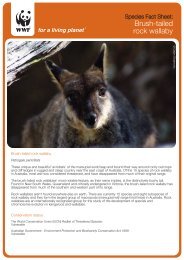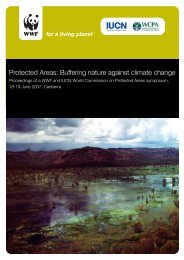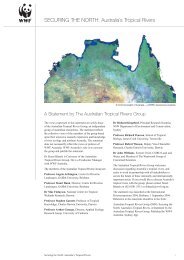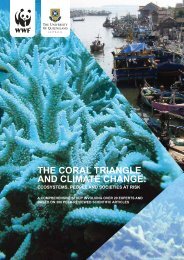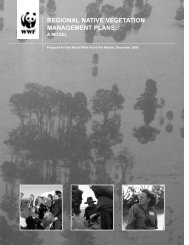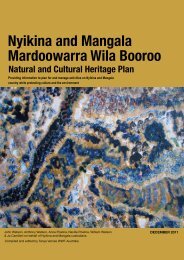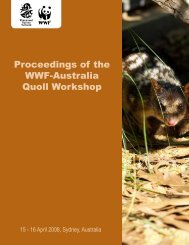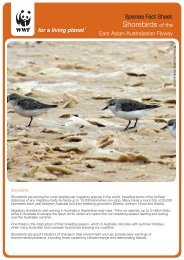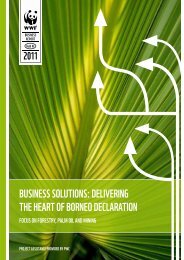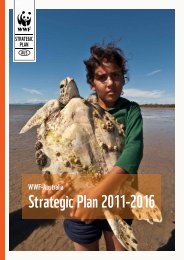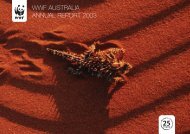Indigenous Peoples and Conservation Organizations
Indigenous Peoples and Conservation Organizations
Indigenous Peoples and Conservation Organizations
Create successful ePaper yourself
Turn your PDF publications into a flip-book with our unique Google optimized e-Paper software.
54 The Xavante in Central Brazil<br />
factory before returning to the community in<br />
1984. Another, Zezinho (the son of Milton,<br />
leader of a major faction), lived with a relatively<br />
well-to-do family <strong>and</strong> stayed long enough to finish<br />
high school. Following their sojourns all<br />
returned to marry in their communities, have<br />
families, <strong>and</strong> become active leaders in Xavante<br />
social life. Of those who now reside in Etéñiritipa,<br />
Suptó is cacique, Paulo is vice-cacique, <strong>and</strong> Jé<br />
Paulo is the current president of AXPB.<br />
Two other boys, Cipassé <strong>and</strong> Jur<strong>and</strong>ir, were sent<br />
to Goiânia. They stayed longer than the boys<br />
who went to Riberão Preto, with the exception of<br />
Zezhinho, partially because scholarships from<br />
FUNAI made it possible. Jur<strong>and</strong>ir completed his<br />
secondary education in 1988, married a white<br />
woman, <strong>and</strong> chose to live in São Paulo. His ties<br />
with the community are irregular. In 1988,<br />
Cipassé married Severiá, an acculturated Karajá<br />
woman active in the urban Indian politics of<br />
Goiânia. While maintaining their primary residence<br />
in the city (at first in Goiânia, more<br />
recently in Nova Xavantina), they also kept a<br />
house in the reserve (initially in Etéñiritipa, most<br />
recently in the newly established community of<br />
Pe’adzarupré) for periodic visits.<br />
While in high school, Cipassé became interested<br />
in indigenous politics beyond community affairs<br />
in Etéñiritipa. His family had controlled<br />
Etéñiritipa leadership before contact with SPI,<br />
although men from other families also played<br />
important community roles. 13 Cipassé’s uncle, 14<br />
Warodi, became cacique during the 1970s <strong>and</strong><br />
continued until being displaced by Milton in<br />
1985. Support for Milton was not unanimous,<br />
however, <strong>and</strong> members of Warodi’s faction<br />
aspired to regain their former prominence.<br />
Warodi <strong>and</strong> his brothers had groomed Cipassé to<br />
be a cacique. During their visits to Goiânia <strong>and</strong><br />
when Cipassé visited the community, they discussed<br />
community politics with him <strong>and</strong> taught<br />
him what they knew (Graham 1995, 61–62). By<br />
1987 Cipassé’s role began to change in these<br />
family meetings. 15 He began to articulate ideas<br />
he was developing through conversations with<br />
UNI’s inspirational Ailton Krenak, pro-Indian<br />
activists, <strong>and</strong> eventually NGO representatives,<br />
ideas concerning projects that would enable the<br />
Xavante to maintain economic <strong>and</strong> cultural<br />
autonomy while living side by side with<br />
Brazilians. The ideas <strong>and</strong> the contacts Cipassé<br />
was developing persuaded the elders that he had<br />
found the pathway for their recently deposed faction<br />
to regain its authority.<br />
The senior members of his faction enthusiastically<br />
embraced Cipassé’s course <strong>and</strong> the possibility<br />
for new types of projects, which were<br />
perceived as markers of status <strong>and</strong> prowess. As<br />
his ideas were transmitted to the community,<br />
Cipassé earned substantial prestige <strong>and</strong> his faction<br />
began to regain some of its former status<br />
even though he did not live in the community.<br />
When the Etéñiritipa Xavante established AXPB<br />
in 1988 with the help of outside advisors,<br />
Cipassé was elected president. As support for<br />
Cipassé grew, support for Milton weakened.<br />
In May 1991, Milton departed with the members<br />
of his faction to join the group in Caçula after<br />
charges that goods purchased from sale of the<br />
community’s cattle had unduly benefited his kin<br />
(see Aparicio Gabara 1994, 24). A leadership<br />
crisis ensued but did not result in Cipassé’s<br />
becoming cacique. Nevertheless his outside<br />
contacts continued to lend him considerable<br />
community support <strong>and</strong> respect.<br />
In his role as a bicultural broker, Cipassé fit the<br />
classic portrait of an indigenous mediator who is<br />
an “uncomfortable bridge” between two worlds<br />
(Karttunen 1994). Outsiders tended to recognize<br />
him as the authentic “chief” <strong>and</strong> often overlooked<br />
other important players. Meanwhile community<br />
members increasingly regarded him with suspicion.<br />
Like other Xavante leaders who have found<br />
themselves in positions to control material goods<br />
<strong>and</strong> outside contacts, Cipassé became a lightning<br />
rod for factional disputes. His control over access<br />
to outside donors exacerbated tensions internally<br />
<strong>and</strong> would play a role in Project Jaburu’s unraveling.<br />
Closely guarding the source of his influence,<br />
Cipassé tightly controlled information flows.<br />
Donors were kept at arm’s length from each other<br />
so that they lost opportunities to coordinate their<br />
efforts by sharing knowledge of what had worked<br />
<strong>and</strong> what had not. According to WWF’s John<br />
Butler, a great opportunity to deepen future collaboration<br />
among donor agencies was lost.<br />
The lack of full information also eroded trust<br />
within the community. Many members became<br />
distrustful of any project Cipassé promoted.<br />
Rumors that he used the community’s name to




